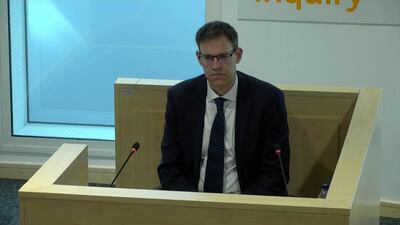The general manager of Manchester Arena said the emergency services failed to use a back entrance in the aftermath of the 2017 terrorist attack which would have enabled ambulances to provide faster treatment for victims.
James Allen told the Manchester Arena Inquiry he arrived shortly after the suicide bombing which killed 22 people and injured hundreds more.
Salman Abedi detonated a bomb in May 2017 at the end of an Ariana Grande concert.
Mr Allen told the inquiry his staff had been told not to leave a control room and had "no contact" with the emergency services. They were not able to make them aware there was a back entrance with space for 12 ambulances.
During the inquiry, the emergency services have been criticised for their slow response and bereaved relatives and survivors have condemned delays in the treatment and evacuation of victims.
"I asked if [my staff] had had any contact with the emergency services, I would have expected it," Mr Allen said.
"I have been very clear that the Arena is there and available for guidance and assistance and anything we could to help but my staff said they had been told to go to the control area and not to leave."
He said he contacted an armed police officer at the incident and got in touch with the officer leading the response who wanted to access their CCTV.
But he said he was surprised the ambulances did not use the rear entrance as they asked all ambulances to use it as they can access the arena "more rapidly".
"We could probably have got 10 to 12 ambulances into that area, or any other things," he said.
Mr Allen also raised concerns over the skills of those giving medical aid to victims on the night of the terrorist attack.
He said the Arena used Emergency Training UK to provide medical aid to anyone attending the venue.
"I thought they did a fantastic job that night, the area that could have been better was the handover with the ambulance service," he said.
"I believe they had a really good level of expertise and a lot of knowledge and experience. I believe they had a really good mix of skills, but having heard some of the evidence we were concerned about the level of skills we expected in the contract."
He said he had asked the firm for more details about the medics employed by it but they had declined to do so, citing "confidentiality".
Mr Allen said a renewed contract with the firm specified that a list of the medics being used and their qualifications should be given to the Arena prior to every event, but the inquiry heard this had not been done.
"We had a contract with them saying they would provide the services we required, we were monitoring it but we did not ask for qualifications at every show."
The Manchester Arena Inquiry is examining the circumstances of the attack and whether any opportunities to prevent it were missed.
It was established by UK Home Secretary Priti Patel in October.
Suicide bomber Abedi, 22, died after detonating a rucksack bomb in a foyer of the arena at the end of the concert.
His younger brother, Hashem Abedi, was convicted last year on 22 counts of murder, one count of attempted murder and one count of conspiracy to cause an explosion.
He was sentenced to jail for a minimum of 55 years.


